CLAS 353
October 24, 2024

Royer, Vercingetorix Throws Down his Arms at the Feet of Caesar (1899)
Response #1 (due Monday, 10-28, in D2L)
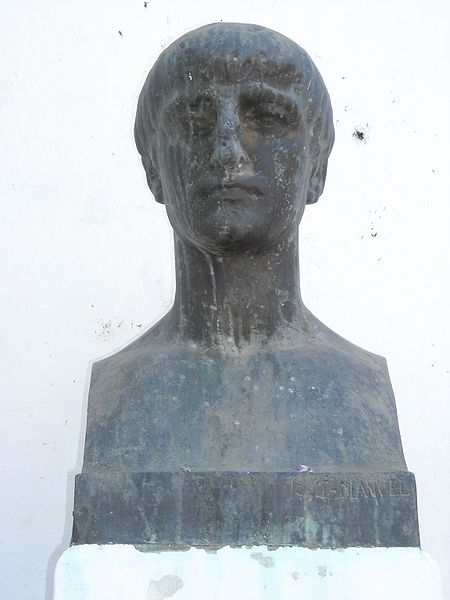
Modern Bust of Lucan (public square, Córdoba)
Lucan, Civil War: Walters's translation (synopses of books, pp. xxxviii-xlviii; Glossary, pp. 239ff.)
- Marcus Annaeus Lucanus ("Lucan"): born in Cordoba, Spain (39 CE), wealthy literary family (his uncle Seneca's protege); educated in Rome; court of Nero (emperor 54-68 CE)
- precocious poet's last years: unfinished Civil War; strained relationship with Nero (Pisonian conspiracy of 65 CE); forced suicide (April 15, 65 CE)
Tacitus, Annals 15.70
[Nero] next ordered the despatch of Lucan. When his blood was flowing, and he felt his feet and hands chilling and the life receding little by little from the extremities, though his heart retained warmth and sentience, Lucan recalled a passage in his own poem, where he had described a wounded soldier dying a similar form of death, and he recited the very verses.
- Bellum Civile aka Pharsalia (". . . our Pharsalia / Will live, not damned to darkness by any age", 9.1011-12)
- tradition of Roman historical epic poetry (e.g. Naevius's 3rd century BCE Punic Wars, Ennius's 2nd century BCE Annals): Julius Caesar (100-44 BCE) vs. Pompey the Great ("Magnus", 106-48 BCE); 49-45 BCE phase of civil wars that end Roman Republic/Roman experiment in constitutional government (cf. Aeneid)
- Civil War: fictionalized historical/poetical memory of events 100+ years before reign of Nero; Lucan's epic hostile toward Caesar(ism) & destruction of Roman Republic/loss of libertas; nostalgia for lost Roman Republic = pro-senatorial elite lamenting lost oligarchy
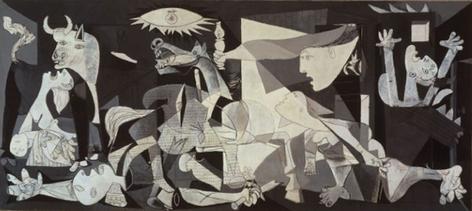
Picasso, Guernica (1937)
- epic of horror: civil war as fragmentation of body politic & society: Civil War not a reconstruction text or transformative national epic; an anti-Aeneid; anti-story of Rome's rise to Golden Age greatness = city's fall into slavery/autocracy
- Lucan as Vergil's critical reader
Aeneid 1.1-7 (Vergil's program; Augustan teleology)
My song is of war and a man: a refugee by fate,
the first from Troy to Italy's Lavinian shores,
battered much on land and seas by blows from gods
obliging brutal Juno's unforgetting rage;
he suffered much in war as well, all to plant
his town and gods in Latium. From here would rise
the Latin race, the Alban lords, and Rome's high walls.
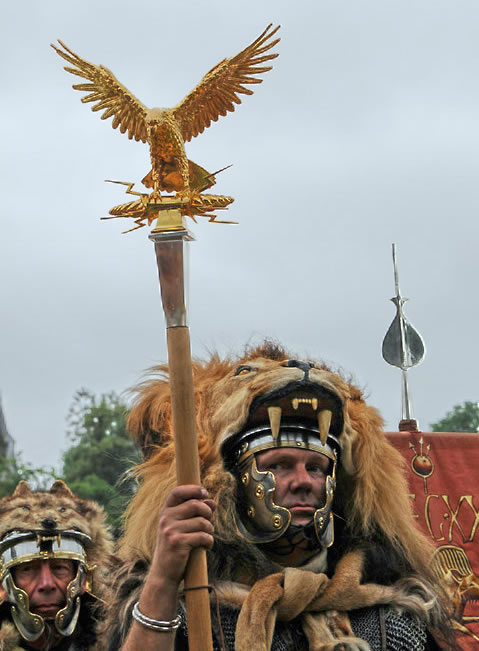
Civil War 1.1-9 (Lucan's programmatic opening = 7 lines in Latin)
Wars—we sing—worse than civil and waged
Across
Thessalian plains, crimes masquerading as law,
A powerful state disemboweling itself with its own
Victorious right hand, fathers fighting against sons,
And when the tyrannical compact was shattered [so-called "First Triumvirate"; death of Crassus in 53 BCE]
All the strength of the shaken world clashed in battle
That stained us with guilt forever—with standards
Pitched on hated
standards, Eagles matched,
Javelins threatening javelins on either side.
[proem continues: Roman imperialism preferable, "Don't you see how much earth and Ocean / This Roman thirst for Roman blood has cost us?" (1.16-17)]
reading of Civil War 1.1-176: https://www.youtube.com/watch?v=-s-Vk7OiCVQ
- untraditionally epic qualities: no epic gods (supernatural forces, esp. Fate, Fortune), no Muses; no central hero; omniscient, reluctant narrator
- narrator: strong personal voice, presence, emotional intensity, e.g. apostrophe (Why this madness, my citizens", 1.10), hyperbole, horror, paradox; narrative delay (digressions, ekphrases; cf. Statius); epic similes (even in political speeches)
Civil War 1.29-39 (dystopic ekphrasis of civil war's effects: past ~ present?)
Now in Italy's cities the walls have crumbled,
The buildings slump half-ruined, their ramparts
Everywhere large piles of stone. The houses stand
Unguarded and the ancient city-streets are empty of all
But the rare inhabitant, wandering in his ghost town.
Now Italy's countryside lies overgrown with brambles,
Her fields unplowed for many years. No hands remain
For the work she demands. You didn't achieve this,
Fierce Pyrrhus, nor did savage Hannibal cause such pain.
No—foreign swords could never pierce so deeply.
The deadliest wounds are dealt by citizen hands.
Civil War 1.83ff. (epic's first simile – Roman power & First Triumvirate)
Like when that final hour finally comes
And the universe's great scaffolding has dissolved,
When all reverts to ancient Chaos, the constellations
Will clash and mix their fiery stars, plunge them into sea . . . [Stoic cycles of cosmic destruction/apocalypse]
. . . Great things collapse
Under their own weight: the gods have placed this limit
On everything's growth. But Fortune did not lend
Her envy of the people who ruled over land and sea
To just anyone. No—you, Rome, are to blame
For your own evils! You let yourself be shared
By three separate men, though tyranny's deadly pact
Had never before known so many masters.
- Lucan's sententiae: clever, pointed, pithy statements for reflection
Civil War 1.141-5 (civil war's inevitability after death of Crassus & Julia)
Caesar can't brook a superior any more than
Pompey can handle an equal. It's unspeakable
To ask who had the greater right to take up arms:
Each side could claim its own moral authority.
The winners had the gods. But the losers had Cato.

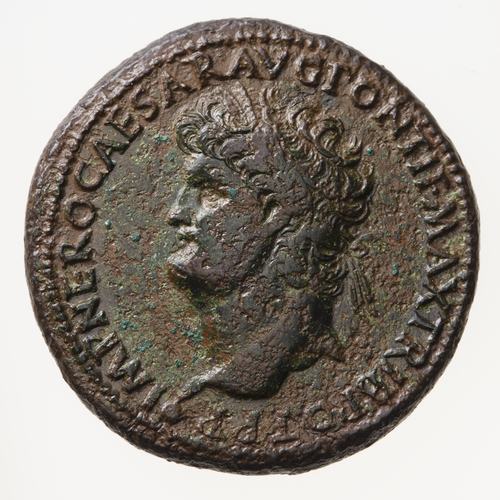
L: Head of Nero (ca. 65 CE); R: sesterius depicting Nero (ca. 66 CE)
- opening panegyric: requirement to flatter emperor (cf. Statius)
Civil War 1.40ff. (snarky teleology of civil war?)
But if the Fates could find no other way
to grant us Nero . . . Every unmentionable
Crime was worth it.
. . . Rome owes much to civil war,
Caesar, since everything done was for you. ["Caesar" = Nero]
(
Nero's catasterism & apotheosis)
. . . Just don't set your throne in the Arctic North
or
where the sweltering hinge turns Southern skies:
Your star's vision of Rome will be slanted there.
And if you place your weight down hard on either side
Of the unbound aether, heaven might fold beneath the burden . . . [Nero's gravitas?]
. . . But you're divine to me already—I'm inspired by you—
I need not move Apollo who stirs Delphi's secrets
Nor bother calling Bacchus away from holy Nysa.
Nero is all I need to give life to Roman song.
- the principal characters: Julius Caesar? Pompey the Great/"Magnus"?
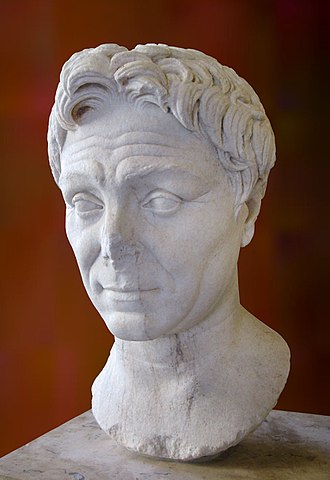

L: Bust of Pompey (52-51 BCE); R: reconstruction of Theater of Pompey (Rome, 55 BCE)
Civil War 1.146-62 (Pompey)
. . . Pompey was old
And in decline, and years of toga-clad peace
Had unmade the general. Hungry for fame
He courted the rabble with constant gifts,
Flitting on the winds of popular favor, basking
In their applause when he entered his theater.
A shadow of his "Great" name,
He stands, like a towering oak in fertile fields
On which old spoils are hung and the dedications
Of long-dead generals. Its roots rotted to nothing
Long ago, only its size now holds it in place,
And though its bare branches spread across the sky,
Its trunk alone casts a shadow, there are no leaves.
Though it totters and almost falls with every breeze,
And many younger trees stand strong all around,
It alone is worshipped.

Bust of Julius Caesar (ca. 45 BCE)
Civil War 1.162-75 (Julius Caesar)
Caesar had the name
And fame as a general, plus was possessed
By an energy that couldn't stay still. He was ashamed
To win anything without going to war. Violent,
Uncontrollable—when ambition or anger called,
He turned his hand unsparingly to the sword
And made his advances, pressing Fortune's favor.
Trampling everything
in his way, he rejoices in ruin
Like a lightning-bolt driven by winds through the clouds
Sparks with loud thunder and shatters the heavens
Into daylight. It terrifies the frightened people
And dazzles their eyes with its jagged flame.
It rages
in its precincts, unstoppable, wreaking havoc
Far and wide and gathering its scattered fires.

Bust of Cato the Younger
- Cato the Younger (Stoic philosopher & politician, 95-46 BCE): Civil War 2
- Caesar's army: cult of personal loyalty (Gaul), speech of Laelius the Centurion
Civil War 1.413-28 (after Caesar's speech leaves soldiers hesitant to march on capitol)
“We're willing and able to follow your every command.
And no one's a fellow citizen of ours, Caesar,
If your war-trumpet sounds against him.
By your standards, fortunate now for ten years,
And by your triumphs over every enemy, I swear:
If you order me to stab my brother in the heart,
Or slit my father's throat, or plunge a sword in the gut
Of my pregnant wife, I'll do it, even if unwilling.
If you order me to rob the gods and raze their temples,
Their statues will melt over the flames of this army's mint.
If you order me to set up camp on the Tiber's waters,
I'll trample Italy's fields boldly and lay the lines.
Whatever walls you want smashed to the ground,
These arms will drive the ram and scatter the stones,
Utterly tearing down whatever city you order—
Even if it's Rome.” [cf. pietas]
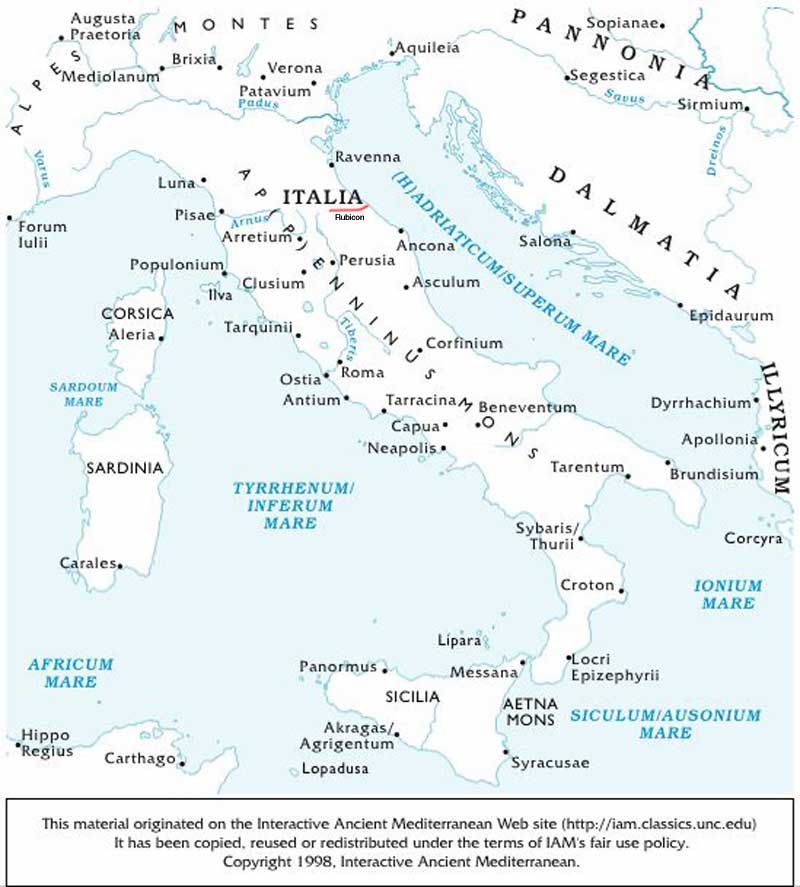
- Rubicon (Gaul/Italy) crossed in January 49 BCE: intervening anthropomorphic Roma, "To what destruction are you rushing . . .?" (1.213); Caesar's only hesitation in epic (1.216-18), but proceeds ("like . . . when a lion sees an enemy approaching, he hesitates, / Lying low in ambush, waiting, gathering his rage . . .", 1.230ff.)

Roma, silver denarius (136 BCE)
- catalogue of Caesar’s allies (1.434ff.) dwarfed by catalogue of Rome's rejoicing enemies (1.466ff.)
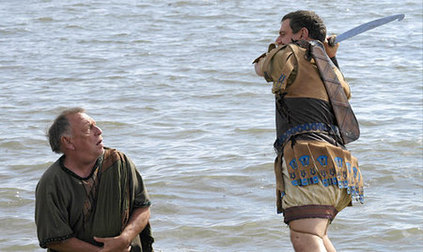
Rome (HBO series, 2005-7)
(one of Caesar's soldiers "gets out of line" in Gaul)
https://www.youtube.com/watch?v=-vJTNGH4Ib0
(the Roman Senate debates on Caesar's status and ambitions)
https://www.youtube.com/watch?v=K9ahNR19myM
(Pompey beheaded)
https://www.youtube.com/watch?v=k3buhlYVLOs
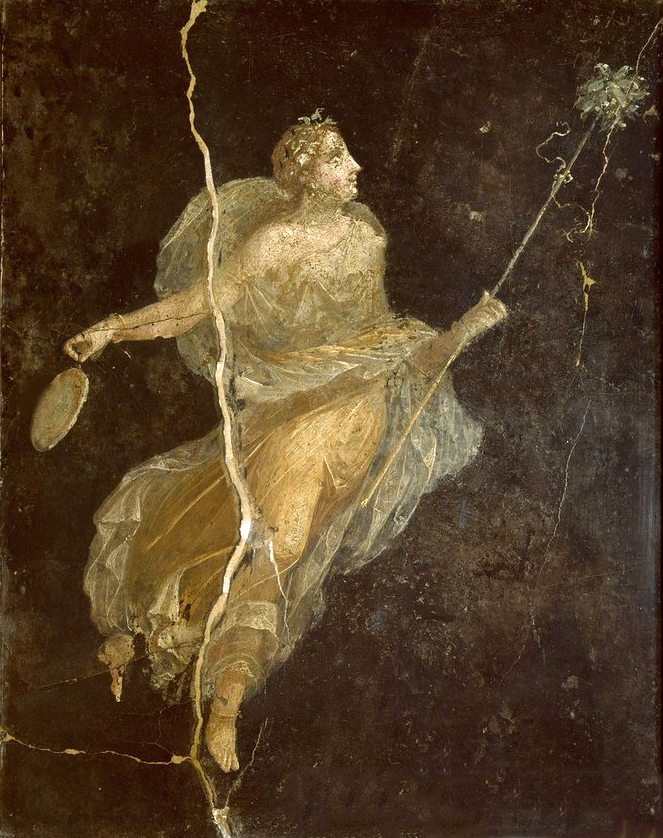
Maenad in silk dress (Pompeii, 1st century CE)
- rumors & panic in Rome (1.563ff.), horrible omens at close of Civil War 1: prophecies of anonymous matron in terrorized Rome ("Wait! Wait!—Him I recognize, / That headless corpse sprawling across wet sands", 1.735-6)
Civil War 1.654ff. (Arruns the soothsayer's grotesque sacrifice & entrail-reading/entispicia)
. . . what jets forth
From the gaping wound is not the normal gore.
Instead of red blood ominous slime fountains and pours
And Arruns turns pale, shocked by the fearful omens.
Snatching up the guts he seeks a reason for the gods' anger.
The very color frightens the soothsayer: knotted guts
Lie covered in foul splotches, quivering infected
With clotted gore, spattered with blood and bruised
All over. He discovers a liver, runny and rotten . . .
. . . Thus Etruscan Arruns sung the future, enfolding
Omens in obscurity, covering them in riddles.
Civil War 1.713-21 (Figulus the astrologer sees bleak Roman future)
"War's fury is upon us: and the power of arms
Will overturn every law by force, virtue
Will be redefined as unspeakable crime,
And this madness will carry on for years and years.
And what's the point in begging gods to stop it?
When peace comes, she'll make slaves of us all!
Prolong the endless chains
of evils, Rome,
Draw out the destruction as long as you can—
You're only free now while civil war still rages!"











